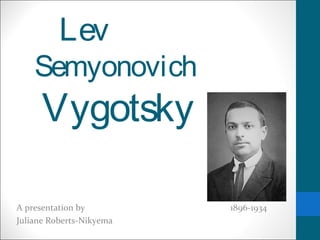
Lev
- 1. Lev Semyonovich Vygotsky A presentation by 1896-1934 Juliane Roberts-Nikyema
- 2. Vygotsky: “The Mozart of Psychology” • Born 1896 in Orscha, Belorussia • Graduated Moscow University with Law Degree • Intense interest in art, literature, and philosophy • No formal training in psychology • Pursued career in psychology • Prolifically wrote books and articles about his theories • Died in 1934 from tuberculosis • Soviet Russia banned Vygotsky’s work from USSR and World • Theories introduced to West in the 1960’s
- 3. Vygotsky’s Sociocultural Theory of Cognitive Development Basic Theory Framework • Social Constructivism • Language and Development • Culture and Development • Zone of Proximal Development • Scaffolding Let’s explore these theories and their classroom applications…
- 4. Social Constructivism • Constructivism – Learner actively collaborates with teacher to create new meaning • Emphasizes how meanings and understandings grow out of social encounters • Cognitive development is directly linked to socialization • Internalization – Learners incorporate society based ideas into internal cognitive structures • Alternative to Piaget’s concepts of behaviorism. Piaget: development precedes learning…Vygotsky: social learning comes before development
- 5. Language and Development • Language plays a central role in mental development • Private Speech • An executive function – productive channels for complex ideas and problem solving • Self talk that guides thinking and action • Tools for thinking, problem solving, higher order functions • Self-regulation - Controls actions and emotions “The most significant moment in the course of intellectual development…occurs when speech and practical activity…converge” - Vygotsky
- 6. Culture and Development •The development of human personality happens during its upbringing and learning – and develops in direct relation to its particular historical era •Personality development takes place during personal social change and /or personal activity •Assimilation of values and culture takes place during collaboration with other people •First there is social interaction – then there is internalization
- 8. Scaffolding •Scaffolding is the tailored support given during learning . It promotes learning when concepts and skills are being first introduced to students • Supports can include: • Resources • Compelling tasks • Guides and templates • Guidance on development of cognitive and social skills • Some ways to use instructional scaffolding: • Modeling a task • Giving advice • Providing coaching • Questioning
- 9. Scaffolding Continued… • Levels and types of scaffolding: • Contingent (soft) scaffolding: Given at time of instruction, may include; conversation, feedback, and questioning while circulating the room • Embedded (hard) scaffolding: Advance preparation for learning tasks that the teacher knows will be difficult • Reciprocal: Group of two or more working collaboratively from each other’s experiences and knowledge. This learning is dynamic and develops higher-level thinking skills and capabilities • Scaffolding supports are gradually removed as students develop autonomous learning strategies. Most effective scaffolding helps the learner figure out the task on their own. “What the child is able to do in collaboration today, he will be able to do independently tomorrow” - Vygotsky
- 10. Also…Vygotsky focused on… •Alternatives to standardized testing – emphasizing cognitive strategies employed by learners, rather than the product itself •Application of theories to special education – created comprehensive, practice based methods And now for the rope… Culture determines the kind of memory strategies we develop. In pre literate societies people tied knot in a rope to remember information.
- 11. Can you find your Zone? • Go to http://www.animatedknots.com • Or…search Animated Knots by Grog • Click on Basic Knots • Using the rope in front of you, tie a knot…yes, a regular knot, then untie it. • Click on the knot specified on your assessment. • With your group, watch the tutorial step by step and learn to tie your knot. Repeat if necessary. • After you have mastered tying your knot, find a partner from a different group and teach your partner your knot. Your partner will then reciprocate and teach you the knot they just learned. • Congratulations! You just learned/taught something new!
- 12. References Vygotsky, L. (1986). Thought and language. Wertsh, J. (1985). Vygotsky and the social formation of mind. http://www.communicationpractices.org/Ideas- vygotskyEducation.htm http://www.edu/~intell/vygotsky.shtml http://www.learningandteaching.info/learning/constructivism.h tml http://www.muskingum.edu/~psych/psychweb/history/vygotsk y.htm http://www.indiana.edu/~intell/vygotsky.shtml
Notas do Editor
- Learning imlications…group learning, tribes
- Classroom applications…emphasis on groupwork, funds of knowledge, collaboration